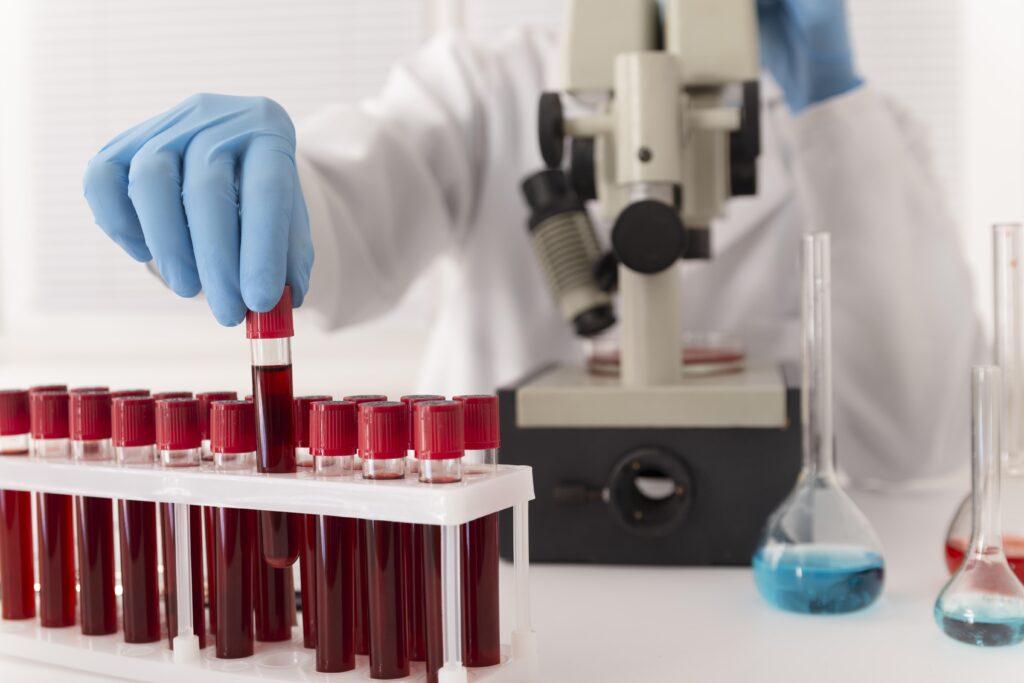Introduction:
Hypertension, commonly known as high blood pressure, is one of the most widespread health conditions globally. It’s often referred to as a “silent killer” because it typically shows no symptoms in the early stages. Over time, however, untreated hypertension can lead to serious complications, including heart disease, stroke, and chronic kidney disease (CKD). The relationship between hypertension and kidney health is particularly concerning because the kidneys are highly sensitive to changes in blood pressure, and their ability to function can be severely compromised by sustained high blood pressure.
In this blog post, we will explore how hypertension affects kidney health, the importance of regular kidney function tests (KFTs), and what you can do to safeguard your kidney health.

Hypertension and Kidney Health: A Two-Way Street
The connection between hypertension and kidney health is complex and operates in both directions. On one hand, high blood pressure can damage the kidneys, and on the other hand, kidney dysfunction can lead to increased blood pressure. Let’s break down these two aspects:
1. How Hypertension Damages the Kidneys
The kidneys play a crucial role in filtering waste products and excess fluids from the bloodstream, which are then excreted as urine. They also regulate important functions like electrolyte balance, blood pressure, and red blood cell production.
The kidneys are supplied with blood through a network of tiny blood vessels, called glomeruli. These delicate structures are particularly vulnerable to the damaging effects of high blood pressure.
When blood pressure remains consistently high, the blood vessels in the kidneys become stressed and may thicken, narrow, or harden over time. This impairs their ability to filter blood properly. The increased pressure can lead to scarring of the kidneys (known as nephrosclerosis) and a reduction in their function. In the long term, this can result in chronic kidney disease (CKD) and eventually kidney failure.
Key Processes Affected by Hypertension:
Glomerular damage: The tiny blood vessels in the kidneys can become damaged, leading to a decrease in the kidneys’ ability to filter waste products.
Impaired filtration: Elevated blood pressure can cause the kidneys to lose their ability to filter blood effectively, which leads to a buildup of toxins and excess fluid in the body.
Proteinuria: High blood pressure can cause protein (such as albumin) to leak into the urine, which is one of the earliest signs of kidney damage.
2. How Kidney Disease Leads to Hypertension
Interestingly, kidney disease can also cause high blood pressure. The kidneys regulate blood pressure through a complex system involving the renin-angiotensin-aldosterone system (RAAS), which helps control the balance of salt, water, and blood volume in the body. When the kidneys are damaged or diseased, they may not be able to perform this function effectively, leading to an increase in blood pressure.
The kidneys may release too much renin (a hormone involved in blood pressure regulation), causing the body to retain more sodium and water, which increases blood volume and pressure. This creates a vicious cycle, where kidney disease leads to high blood pressure, which in turn exacerbates kidney damage.
The Impact of Chronic Kidney Disease (CKD)
Chronic kidney disease (CKD) is a progressive condition where the kidneys gradually lose their ability to function. High blood pressure is one of the leading causes of CKD, and kidney disease, in turn, worsens hypertension. The majority of individuals with CKD have high blood pressure, and the relationship between the two can be devastating. Over time, CKD can progress to end-stage renal disease (ESRD), where the kidneys are no longer able to filter waste from the blood, requiring dialysis or a kidney transplant to survive.
Symptoms of CKD Include:
– Swelling in the legs, ankles, or feet (edema)
– Fatigue and weakness
– Shortness of breath
– Nausea or vomiting
– Changes in urine output or appearance
– High blood pressure that is difficult to control
Since CKD often develops slowly and silently, regular monitoring through blood tests, urine tests, and blood pressure checks is essential, especially for individuals with hypertension.
Must Read: How is early kidney disease detected ?
The Role of Kidney Function Tests (KFTs)
Kidney function tests (KFTs) are a group of blood and urine tests used to assess how well the kidneys are working. These tests can detect early signs of kidney damage, even before symptoms become apparent. For individuals with hypertension, regular KFTs are critical for monitoring kidney health and preventing or managing kidney disease.
1. Common Kidney Function Tests
Here are some of the most common tests used to evaluate kidney function:
Serum Creatinine: This is a waste product produced by muscles and filtered out by the kidneys. Elevated creatinine levels in the blood suggest that the kidneys are not functioning properly.
Blood Urea Nitrogen (BUN): This test measures the amount of urea nitrogen in the blood, a waste product that the kidneys normally filter out. High BUN levels can indicate kidney dysfunction.
Estimated Glomerular Filtration Rate (eGFR): The eGFR is a calculation based on creatinine levels, age, gender, and race, which estimates how well the kidneys are filtering waste. A lower eGFR suggests reduced kidney function and is a key indicator of CKD.
Urine Albumin (or Proteinuria): Protein in the urine is a sign of kidney damage, and a simple urine test can detect this. Persistent proteinuria is an early sign of kidney problems.
Urinalysis: This test examines the physical and chemical properties of urine, looking for abnormalities like blood, protein, or abnormal pH that can indicate kidney damage.
2. Why Regular KFTs Are Crucial for Hypertensive Patients
For individuals with high blood pressure, regular KFTs can help detect kidney damage early, before it becomes severe and irreversible. By identifying kidney issues early, healthcare providers can take steps to slow or stop the progression of kidney disease, potentially preventing kidney failure.
Additionally, regular KFTs allow for more precise management of hypertension. If kidney function is declining, doctors can adjust treatment plans to address both the high blood pressure and the kidney function, often using medications like ACE inhibitors or angiotensin II receptor blockers (ARBs) that help protect the kidneys.
Preventing Kidney Damage in Hypertensive Individuals
While hypertension poses a serious risk to kidney health, there are several lifestyle changes and medical interventions that can help prevent or slow kidney damage:
1. Blood Pressure Management
Maintain a healthy weight: Losing excess weight can significantly lower blood pressure.
Adopt a heart-healthy diet: The DASH (Dietary Approaches to Stop Hypertension) diet, rich in fruits, vegetables, whole grains, and lean proteins, has been shown to lower blood pressure.
Exercise regularly: Physical activity helps maintain a healthy weight and reduce blood pressure.
Limit sodium intake: High sodium levels can raise blood pressure, so reducing salt intake is crucial for hypertension management.
Limit alcohol consumption: Excessive alcohol can increase blood pressure, so it’s important to drink in moderation.
Quit smoking: Smoking damages blood vessels and exacerbates high blood pressure.
2. Monitor Kidney Health
Regular check-ups: Visit your healthcare provider regularly to monitor blood pressure and kidney function. Early detection is key.
Take prescribed medications: If you’re prescribed medications for high blood pressure or kidney disease, take them as directed. Common medications for hypertension include ACE inhibitors, ARBs, diuretics, and calcium channel blockers.
3. Stay hydrated
Drinking adequate amounts of water helps the kidneys function properly.
Hypertension is a significant risk factor for kidney disease, and kidney health, in turn, has a major impact on blood pressure regulation. The relationship between the two is a vicious cycle that can lead to progressive kidney damage and heart-related issues if left unchecked. By understanding this connection and the importance of regular kidney function tests (KFTs), you can take proactive steps to safeguard your health.
If you have high blood pressure, make sure to schedule regular check-ups with your healthcare provider, monitor your kidney function with KFTs, and implement lifestyle changes to manage your blood pressure. Early detection and proper management can go a long way in preventing kidney damage and preserving your kidney function for years to come.
Get in touch with our experts today to book your KFT.




Very nice content to read